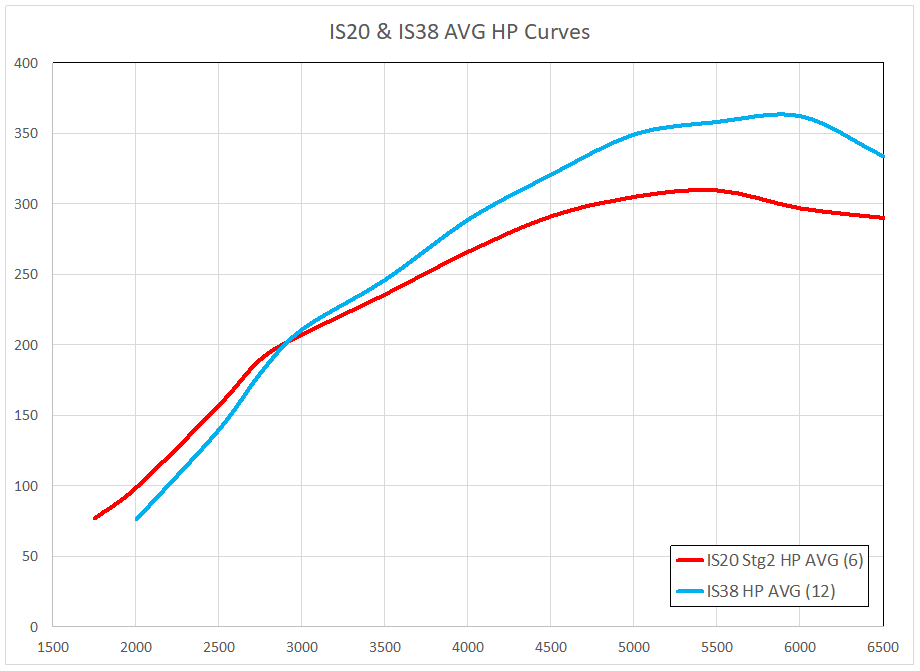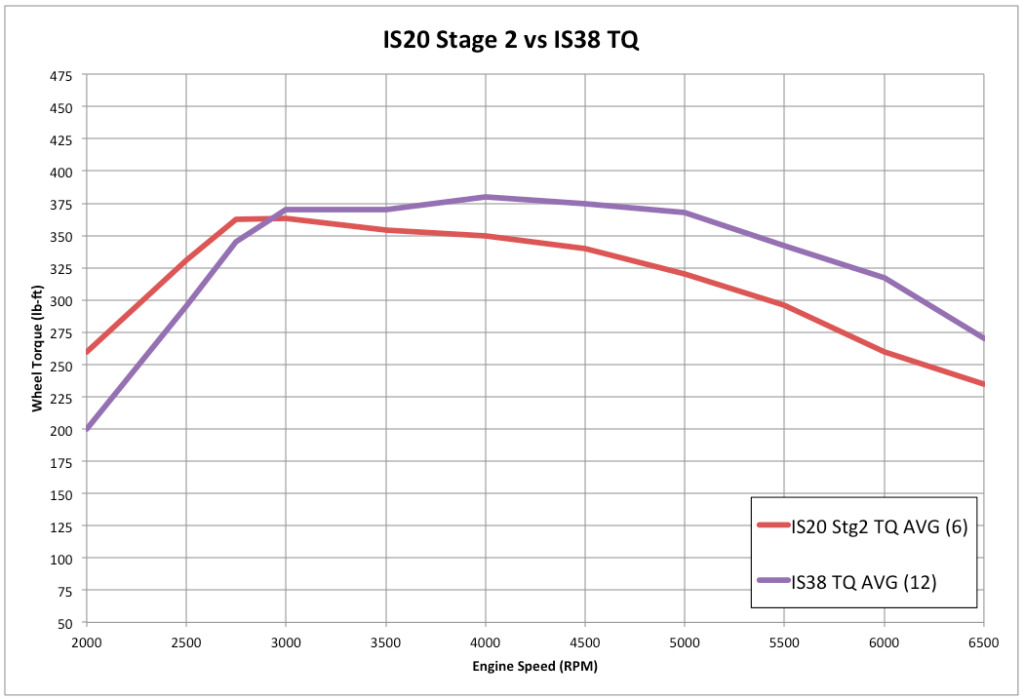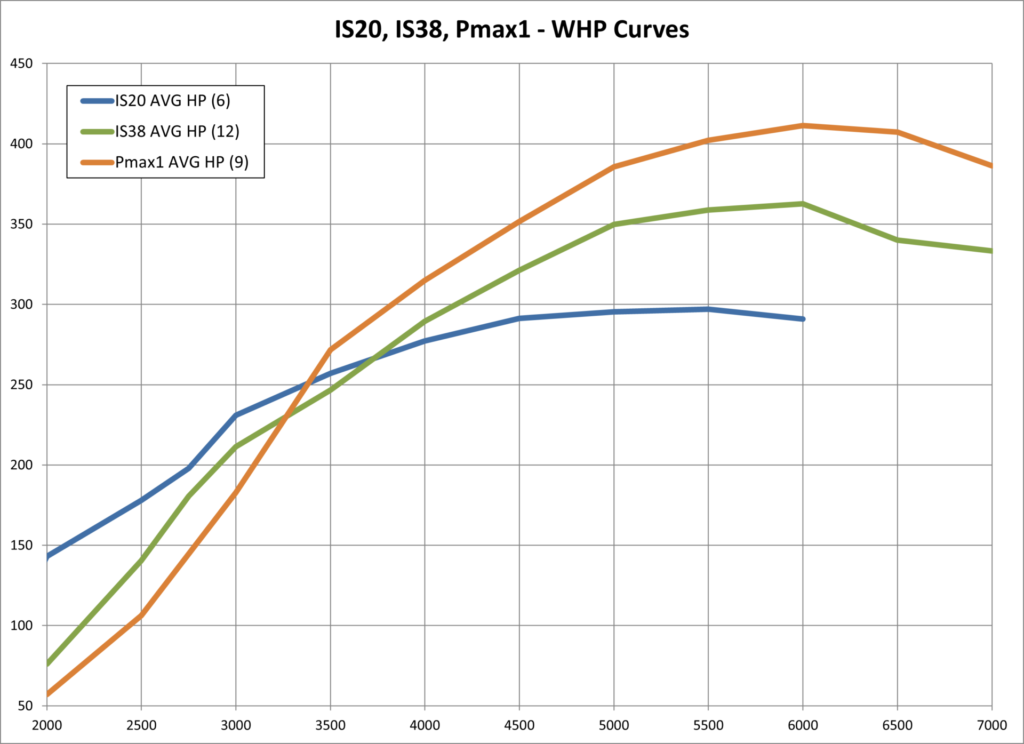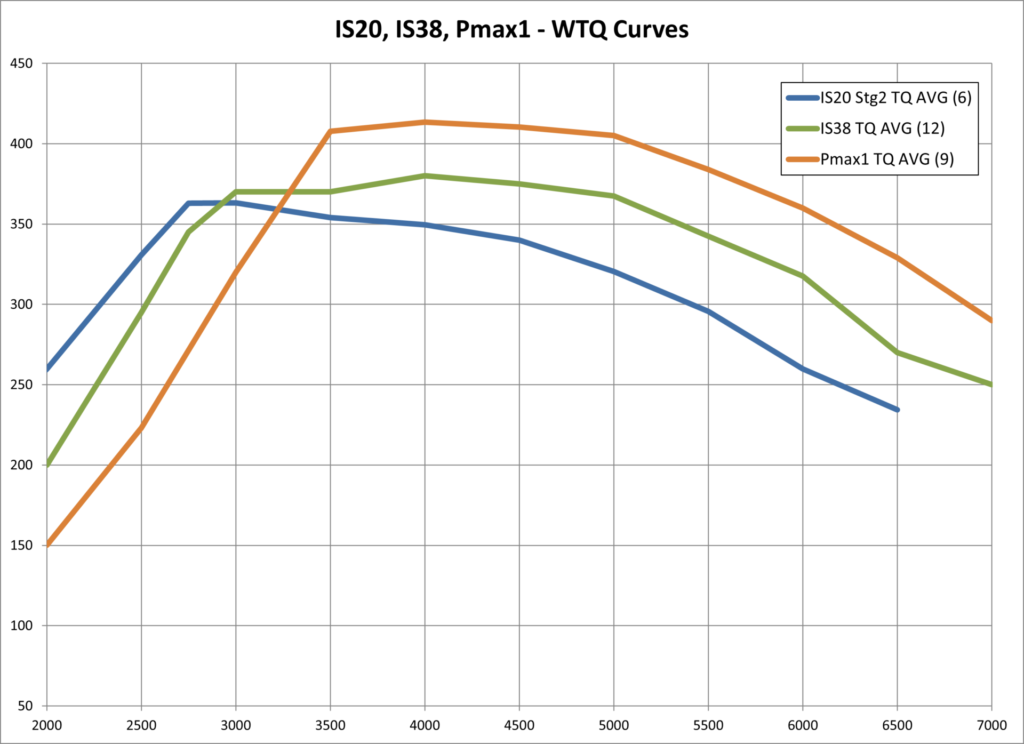Background:
One of the questions I had when planning a swap from the IHI IS20, which is stock in the Mk7 GTI, to the Golf R IHI IS38 was how the two turbochargers compare.
I collected a bunch of dyno charts that were posted by others for the IS20 and the IS38. From the collection I selected a half-dozen Stage 2 IS20 dyno charts and a dozen for the IS38.
I averaged the Horsepower curves for each turbocharger and then did the same for the Torque curves.
Then the data was overlayed to create the charts below.
Turbo Comparison Charts:
Each chart has some variability that is “hidden” by using an average, but these charts should give you a rough idea of how a Stage 2 IS20 compares with a tuned IS38 turbocharger.


Later, with the introduction of the Garrett Pmax Stage 1 turbocharger, which I thought was a nice alternative to the IS38, I gathered dyno charts for the Garrett product and added them to my charts.
As with the IS20 and IS38 dyno charts, these charts show averages, and individual results “will” vary.
With the Garret turbo, I did make sure to only use dyno charts from pump gas tunes.
I also extended the RPM axis out to 7,000 RPM since more data was available for this turbo out to this operating point. I did not have any data for the IS20 out to 7,000 RPM and the IS38 only had a couple of data points, resulting in a rougher line out at the upper RPM range.



Very nice topic.
All on stock fueling 2.0? (HPFP / LPFP)
I don’t have details about the setups for each car. The main purpose when I put the charts together was to get an idea of what moving from an IS20 to an IS38 would change. Would there be a great loss of low-end torque, how much more top-end is there on an IS38 compared to an IS20? Over the past couple of years I’ve seen other people ask about making the change from the IS20 to IS38 and I thought I should post these charts so I can use them as a reference when those questions are asked.
It was never intended to be a detailed comparison, I’d use my own car for that purpose.
Fair enough.
I had the 20 and then the 38 on my 1.8 Golf Sportwagen and have done lots of logging and data collection including a large amount of Dragy 0-60, 1/8, and 1/4 mile runs. Similar looking results to yours….a bit longer to spool, more overall power/torque, less drop off at the far end/higher RPM.
Done the change as well and found the is20 running stage2 way more responsive and for all day driving a way better option. The is 38 takes a while to spool up and then from 3000 rpm all hell breaks loose . My guess would be a is20 hybrid would be a better option .
I had a pair of GTIs for about a year, one IS20 and the other IS38. My experience was different, I didn’t notice a compelling reason to swap the one back to an IS20, even though on paper the IS20 boosts quicker.
The only IS20 hybrid I’ve given serious consideration to using is the LM440 IS20.
I just got my car back today with the is38 installed. I drove it home from the shop running eqt’s stage 2 is20 tune. I got on it pretty hard a couple times. Didn’t throw any lights or have any issues. Waiting to receive my is38 tune from eqt before taking it back out though but as far as I can tell, im going to enjoy the is38 more based on the top end power alone.
Thanks for the initial impressions. I’ve also thought the IS38 is a nice size turbo for the GTI owner looking for a bit more power.
Does Garrett PowerMax has different air flow so IS38 software can’t work properly with it ?
I don’t believe you would have good success using an IS38 tune with the Garrett. In addition to the compressor and turbine wheels being different size, I believe the Garret uses a different wastegate actuator.
If you’re considering an IS38, I would recommend the Pmax Gt2260S. Mine made 29lbs by 3000 RPM, and the transient response made be even a little better than an IS38. You’re also going to get a more reliable turbo long term. The downside is your going to need to run a calibration designed for is, Custom or IE
Thanks for the feedback on your experience with that turbo, it seems like a nice alternative.
Can’t wait to share dyno chart of my Tiguan 2.0 AWD with GT2260S! From basic simulations that I have built, it would get to around 430hp (flywheel), 20.17psi boost 2.69 AFR octane 91 pump gas – limitation on compressors’ surge & choke lines.